Text
The Anemoi
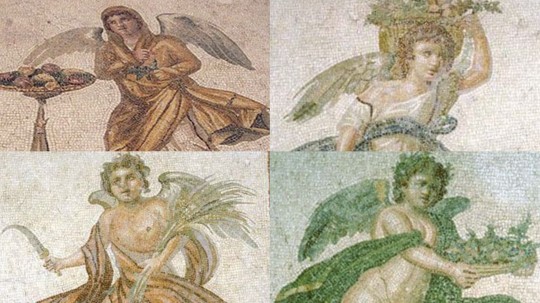
Hesiod, Theogony 869 ff :
"Notos (the South Wind) and Boreas (the North Wind) and clear Zephyros (the West Wind). These Winds are a god-sent kind, and a great blessing to men."
The Anemoi are the gods of the winds, especially the main four, but there are up to 24 different winds. Eight of these winds appear on Wind Towers, like the one in Athens, and act as both a devotional object, as the winds were often worshiped together as the Anemoi, and as a directional tool.
The Anemoi are all ruled by Aeolus, son of Hippotes, who was appointed to this position by Zeus. The winds themselves are the children of Eos, goddess of the dawn, and her husband Astraeus, an astrological god also associated with dusk/twilight.
In mythology and poetry, they often appear as tools of the Olympians, especially Zeus and Poseidon, who can command the winds to help in their endeavors, though they do appear helping other gods as requested. However, the witch Medea also calls on the Anemoi to aid in her magic.
Ovid, Metamorphoses 7. 192 ff (trans. Melville) (Roman epic C1st B.C. to C1st A.D.) :
"[The witch] Medea . . . in the deep stillness of the midnight hour . . . To the stars she stretched her arms, and thrice she turned about and thrice bedewed her locks with water, thrice a wailing cry she gave, then kneeling on the stony ground, ‘O Nox (Night) [Nyx], Mother of Mysteries, and all ye golden Astra (Stars) who with Luna (the Moon) [Selene] succeed the fires of day, and thou, divine triceps (three-formed) Hecate, who . . . dost fortify the arts of magic, and thou, kindly Tellus (the Earth) [Gaia], who dost for magic potent herbs provide; ye Venti (Winds) [Anemoi] and Aurae (Airs) . . . be with me now! By your enabling power, at my behest . . . my magic song rouses the quiet, calms the angry seas; I bring the clouds and make the clouds withdraw, I call the winds and quell them.’"
From this, other ancient magical practioners took inspiration.
Pausanias, Description of Greece 2. 12. 1 (trans. Jones) (Greek travelogue C2nd A.D.) :
"In Titane there is . . . an Altar of the Anemoi (Winds), and on it the priest sacrifices to the Anemoi (Winds) one night in every year. He also performs other secret rites [of Hekate (Hecate)] at four pits, taming the fierceness of the blasts [of the winds], and he is said to chant as well the charms of Medea."
The Ruler of the Anemoi - Aeolus
Aeolus is the God of the Winds and the king of the island of Aeolia. He was appointed as Keeper of the Winds by Zeus. Aeolus supposedly kept the most brutal of winds trapped in a cave on Aeolia. He was sometimes petitioned to let them loose to aid in some cause, by both gods an mortals. He is sometimes portrayed as a face in the sky blowing on some object, a trait he shares with all of the Anemoi. His sacred animal is the kingfisher.
His most famous appearance by far is his role in Homer's Odyssey:
Homer, Odyssey 10. 1 ff (trans. Shewring) (Greek epic C8th B.C.) :
"[Odysseus tells the tale of his wanderings :] We came to the Aiolian (Aeolian) island (nesos Aiolios); here lived Aiolos (Aeolus) Hippotades (son of Hippotas); the deathless gods counted him their friend. His island is a floating one; all round it there is a wall of bronze, unbreakable, and rock rises sheer above it. Twelve children of his live in the palace with him; six are daughters, six are sons in the prime of youth; moreover the king has given his daughters as wives to his sons. These all hold a continual feast with their dear father and much-loved mother; countless dainties are there before them, and through the daytime the hall is rich with savoury smells and murmurous with the sound of music. At night they sleep, each with his own chaste wife, on inlaid bedsteads with coverlets over them.
To their city and noble palace we now came, and for a whole month Aiolos gave me hospitality and questioned me on all manner of things, Ilion [i.e. Troy] and the Argive ships and how the Akhaians (Achaeans) sailed for home. I duly told him all he desired; then in my turn I asked his leave to depart and begged him to help me on my way. Nor was he unwilling; he set about speeding my return. He gave me a bag made from the hide of a full-grown ox of his, and in the bag he had penned up every Wind (anemos) that blows whatever its course might be; because Kronion (Cronion) [Zeus] had made him warden of all the Winds (anemoi), to bid each of them rise or fall at his own pleasure. He placed the bag in my own ship's hold, tied with a glittering silver cord so that through that fastening not even a breath could stray; to Zephyros (the West Wind) only he gave commission to blow for me, to carry onwards my ships and men. Yet he was not after all to accomplish his design, because our own folly ruined us.
For nine days and through nine nights we sailed on steadily; on the tenth day our own country began to heave in sight; we were near enough to see men tending their fires on shore. It was then that beguiling sleep surprised me; I was tired out, because all this time I had kept my own hands on the steering-oar, never entrusting it to one of the crew, for I wished to speed our journey home. Meanwhile the crew began murmuring among themselves; they were sure I was taking home new presents of gold and silver from Aiolos.
One of them would say as he eyed his neighbour : ‘What injustice! In whatever city or land he comes to, this man wins everyone's friendship and regard. He is taking back a mass of fine things from the spoils of Troy, while we who have journeyed with him from the first to last are returning home all empty-handed. And now come these latest gifts that Aiolos in his hospitality had indulged him with. Come, let us look without wasting time. What are these gifts? How much gold and silver is there inside the bag?’
Thus the men talked among themselves, and the counsels of folly were what prevailed. They undid the bag, the Winds (anemoi) rushed out all together, and in a moment a tempest (thuella) had seized my crew and was driving them--now all in tears--back to the open sea and away from home.
I myself awoke, and wondered if now I should throw myself overboard and be drowned in ocean or if I should bear it all in silence and stay among the living. I did bear it and did remain, but covered my face as I lay on deck. My own ship and the others with it were carried back by raging storm (anemos thuella) to the island of Aiolos (nesos Aioloios), amid the groaning of all my company.
There we set foot ashore and drew water, and without delay my crews and I took our meal by the rapid ships. When we had had our portion of food and drink, I chose to come with me one man as my own attendant and one besides; then I sent up to the place of Aiolos, and found him feasting there with his wife and children. We went in and we sat down at the threshold by the doorposts, while the household asked in deep amazement : ‘Odysseus, how is it that you are here again? What malicious god has set upon you? Surely we did our best before to speed you upon your way, meaning to reach your own land and home or whatever place you might desire?’
So they spoke, and I said despondently : ‘Faithless comrades were my undoing, they and the slumber that betrayed me. But you are my friends; you have the remedy; grant it me.’
With these humble words I made my appeal to them. They remained in silence, except the father, who answered me : ‘Away from this island, away at once, most despicable of creatures! I am forbidden to welcome here or to help send elsewhere a man whom the blessed gods abhor. This return reveals you as god-forsaken; go!’
And with these words he drove me forth despite my pitiful lamentations. Then we sailed onwards sick at heart."
The Four Cardinal Winds
Boreas (Roman name: Aquilo/Septentrio)
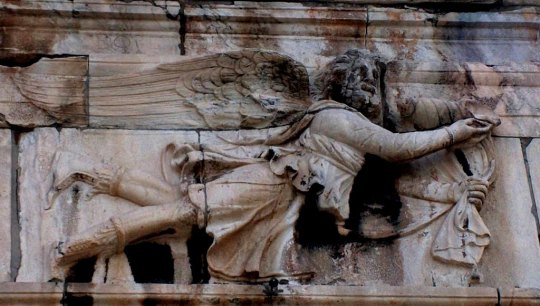
Of all the Anemoi, Boreas is the one we have the most information about. He is the god of the north wind and is associated with cold temperatures and the mountains in the north of Greece, and therefore, the element of earth. From his name, we get the term aurora borealis. Boreas was famous for his strength and temper. He is often depicted with shaggy hair and beard, with a billowing cloak and a conch shell in his hands. His sacred animal is the horse.
He is represented on ancient compass roses in the north with the name Septentrio.
In mythology:
Boreas delivered Leto to Poseidon by order of Zeus, so Poseidon could take her to the island of Ogygia where she would be safe to give birth to Apollo and Artemis.
Boreas was said to have kidnapped an Athenian princess he had taken a shine to named Orithyia. Originally, he had attempted to convince her to come with him, but when she refused, he kidnapped her instead, showing the temper he was well known for. She did not consent, but their children include sons Zethes and Calais (of Argonaut fame), Chione, the goddess of snow, and another daughter named Cleopatra (unrelated to the Egyptian queen). It is through his relationship with Orithyia that he came to be a "son-in-law" of Athens and the Athenians.
In another story, Boreas competed with Pan for the affections of a nymph named Pitys. Boreas tried to prove his might by uprooting all of the trees. Unfortunately, Pan only laughed at Boreas' show of strength and his joviality won Pitys' affection. Angered by her rejection, Boreas threw Pitys' off a cliff, where she died. Gaia took pity on the nymph and transformed her into a pine tree.
In an Aesop fable, Boreas competed with his uncle, Helios, to get a travelling passerby to remove his cloak, in an attempt to prove which god was strongest. Boreas tried to blow the cloak off the man, but the harder he blew, the tighter the man wrapped the cloak around himself. Helios instead, made the sun shine bright and heat the land. The man removed his cloak when it got too hot. The moral of the story is that persuasion is better than force.
According to Pausanias, Boreas blessed Musaeus of Athens with the gift of flight.
Pausanias, Description of Greece 1. 22. 7 (trans. Jones) (Greek travelogue C2nd A.D.) :
"I have read verse in which Musaios (Musaeus) [the poet] receives from Boreas the gift of flight, but, in my opinion, Onomakritos (Onomacritus) wrote them."
[N.B. Musaios and Onomakritos were both Orphic poets.]
There are many claims that Boreas, in the form of a stallion, impregnated mares across the ancient world, and variations on these stories appear in Homer's Iliad and Virgil's Georgics 3.
In the Orphic Hymns, Boreas is also listed as a god of the season of winter.
Orphic Hymn 80 to Boreas (trans. Taylor) (Greek hymns C3rd B.C. to 2nd A.D.) :
"To Boreas (the North-Wind), Fumigation from Frankincense. Boreas, whose wintry blasts, terrific, tear the bosom of the deep surrounding air; cold icy power, approach, and favouring blow, and Thrake (Thrace) awhile desert, exposed to snow: the air's all-misty darkening state dissolve, with pregnant clouds whose frames in showers resolve. Serenely temper all within the sky, and wipe from moisture aither's splendid eye."
The cult of Boreas:
Boreas was worshiped as a protector of Athens and sacrificed to when the city needed protection, though it is unknown exactly what these sacrifices were.
There are a few different accounts, but the main plot is this:
The Athenians received a message from an oracle that to protect the city, they should call on their ally who was a "son-in-law" of Athens/the Athenians. Boreas was considered a son-in-law of Athens because of his marriage to Orithyia, who was an Athenian princess. The Athenians made sacrifices to both Boreas and Orithyia in the hopes that they would destroy a barbarian fleet threatening them. The fleet was destroyed and a special district dedicated to Boreas was created.
Notos (Roman name: Auster/Australis, Notus when the Greek name was retained with Latin spelling)

Notus is the god of the south wind and is associated with winds from the sea to the south of Greece. He is usually depicted pouring water from a vase, like rain on crops. The winds he brings are hot. He is also said to be responsible for the storms of late summer and early autumn in Ancient Greece and Rome, indicating that his winds are both hot and moist, carrying moisture from the Mediterranean sea to the south onto the continent to the north, corresponding to the element of water. He was also feared as a destroyer of crops. On ancient compass roses, he is represented by the name Australis, from which the name Australia is derived. Notus does not have any sacred animal mentioned for him alone, but the horse is sacred to the Anemoi as a group.
The Romans associated him with the clouds and harsh winds and storms that would blow in from the south.
In Mythology:
Notus does not appear prominently in mythology outside of helping the other gods when called upon, usually with his brothers.
In the Orphic Hymns, Notus is associated with the season of Summer.
Orphic Hymn 82 to Notus :
"To Notos (Notus, the South-Wind), Fumigation from Frankincense. Wide-coursing gales, whose lightly leaping feet with rapid wings the air's wet bosom beat, approach, benevolent, swift-whirling powers, with humid clouds the principles of showers; for showery clouds are portioned to your care, to send on earth from all-surrounding air. Hear, blessed power, these holy rites attend, and fruitful rains on earth all-parent send."
Euros (Roman name: Vulturus/Volturus, but Roman poets often retained the Greek name with the Latin spelling Eurus)
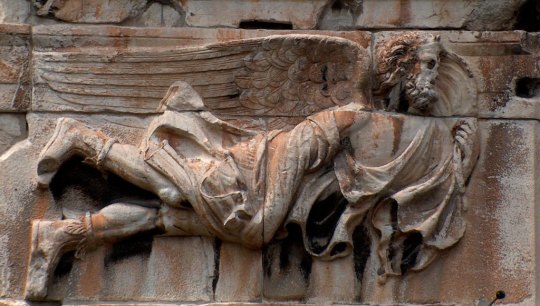
Euros is the god of the east wind and dwelt near the palace of Helios, his uncle. He is said to bring a hot wind, and with his close proximity to Helios, is associated with the element of fire. Little else is known about Euros, as he is the least mentioned of all the Anemoi. Euros is depicted as a bearded man holding a heavy cloak. No animal is known to be sacred specifically to Euros, but horses are sacred to all of the Anemoi as a single group.
In Mythology:
Most references to Euros in mythology are passing. Most of what is attributed to Euros comes from the poets of the time, including Homer, Virgil, and Ovid.
One source lists Euros as the "Savior of Sparta."
Greek Lyric V Folk Songs, Frag 858 (from Strasbourg papyrus) (trans. Campbell) (B.C.) :
"Send a breeze then, over the fields . . . soft wind . . . Euros (East Wind) : Euros, saviour of Sparta, may you come with victory at all times! Ie Paian, ieie Paian!"
Euros is unofficially the god of Autumn. He fills the fourth seasonal slot most modern people associate with autumn, however, the ancient Greeks only recognized three seasons. There are no mentions of him in the Orphic Hymns.
It is important to note that Euros sometimes appears as the god of the southeast wind and Apeliotis as the east wind. Apeliotes also has associations with autumn.
Zephyros (Roman name: Favonius, Zephyrus when the Greek name was retained with Latin spelling)

Zephyros is the god of the west wind and is depicted as a beardless youth scattering flowers from his mantle, often with wings, associating him with the element of air (though, arguably all of the Anemoi are related to air). He and his winds were said to be most gentle and provided ships with favorable winds for sailing. He was known as the fruictifying wind and the messenger of spring. He is sometimes depicted as carrying a basket of unripe fruit. His sacred animals are his offspring, the horse and the tiger.
In Mythology:
Zephyros most famously appears in the myth of Apollo and Hyacinthus. Both gods were in love with a Spartan man named Hyacinthus. Apollo and Hyacinthus often spent time together, and one day, started a game of discus. Zephyros spotted them, and in a jealous rage, blew the discus off course, which then struck Hyacinthus in the forehead and killed him. Apollo, in his grief, turned Hyacinthus into a flower (either an iris or larkspur, depending on the telling).
Zephyros vied with his brother, Boreas, for the love of the nymph, Chloris (Flora in Roman mythology). Boreas, however, stole Orithyia from her father's home instead, allowing Zephyros to pursue Chloris uncontested. He married Chloris and made her the goddess of flowers.
Zephyros also had a relationship (or marriage, depending on the source) with the messenger of the Olympians and goddess of rainbows, Iris. Sometimes, they are listed at the parents of the Erotes: Pothos, Eros, and Himeros, though other accounts list their mother as Aphrodite. In other accounts, Eros was the son of Iris and Zephyros (or Aphrodite), and Pothos and Himeros the children of Eros, making them the grandchildren of Iris and Zephyros (or Aphrodite).
In the story of Eros and Psyche, it is Zephyros who delivers Psyche to the home of Eros.
Through the harpy Podarge, Zephyros was the father of the horses of Achilles, Balius and Xanthus, mirroring his opposite brother Boreas's association with horses.
Roman mythology gives him the additional domain of plants and flowers
In the Orphic Hymns, Zephyros is associated with Spring.
Orphic Hymn 81 to Zephyrus :
"To Zephyros (Zephyrus, the West-Wind), Fumigation from Frankincense. Sea-born, aerial, blowing from the west, sweet Breezes (Aurai, Aurae), who give to wearied labour rest. Vernal and grassy, and of murmuring sound, to ships delightful through the sea profound; for these, impelled by you with gentle force, pursue with prosperous fate their destined course. With blameless gales regard my suppliant prayer, Zephyros unseen, light-winged, and formed from air."
The Cult of Zephyros:
There were two known temples to Zephyros, one on the Isle of Rhodes, and the other in the town of Laciadae. It is also said that the Argonauts made an altar to Zephyros, among others, while preparing to depart on a voyage.
The Lesser (Tertiary) Winds
These wind gods cover the tertiary directions and are featured on wind towers and early compass roses, but little is known about them.
Lips (Roman name: Africus)
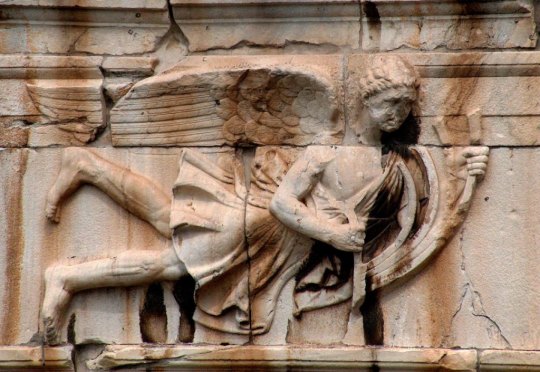
Lips is the god of the southwest wind and is depicted on the Tower of the Winds in Athens as a winged man holding the stern of a ship. He was a favorite of sailors.
KAIKIAS (Roman name unverified)
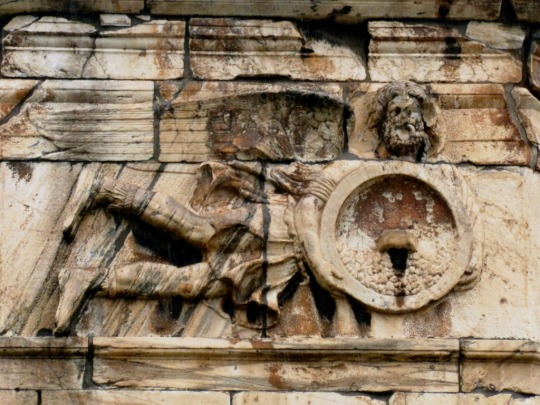
Kaikias is the god of the northeast wins and is portrayed as a bearded man with a shield full of hail-stones. These hail stones may reference severe, destructive storms.
APELIOTES (Roman name unverified)

Apeliotes is the god of the southeast wind and is depicted as a clean-shaven man, holding a cloak full of fruit and grain. He is associated with autumn and sometimes switches places with Euros.
SKIRON (Roman name unverified)
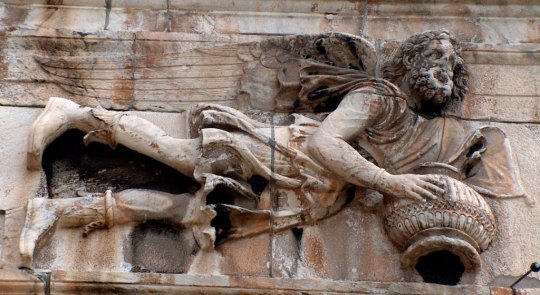
Skiron is the god of the northwest wind and depicted as a bearded man tilting a cauldron, potentially signifying the onset of winter. He is also associated with violent storms and winds.
74 notes
·
View notes
Text
Whistling Up The Wind - A Technique For Calling The Wind to Your Aid

Of the spirits of the elements out there that I have worked with, the wind has so far been the easiest and most useful.
Before getting started, I suggest spending some time getting to know the wind spirits around you. Sit outside and feel the wind. Let your energy out to flow and ride with them, feel the world from their perspective. In my experience, they are usually quite friendly and curious. Once you've done that, you're ready to get started.
First, create your whistle. Mine is just the first three notes of the Hunger Games whistle, but it can literally be any sequence you want.
Once you have your whistle in place, head outside and either stand or sit. Gather energy around you (in whatever way you normally would), then use that energy to become a beacon. Something that says "I'm here! I am calling!" I picture myself holding up one of those old 90s ribbon dancer toys above my head like an antenna. This gets the spirits' attention. Now, focus on the wind and that you want to call it to blow around you, then whistle. This may take practice as you and the wind build your own language together.
Eventually, you will get to a point where you can call the wind spirits whenever you like. I got to the point where we could even play games together, like having them push a square scarf I held out in front of me against my body no matter which direction I faced.
It's a handy relationship to have on hot days as well. I also never feel lonely, since the wind spirits are always there!
42 notes
·
View notes